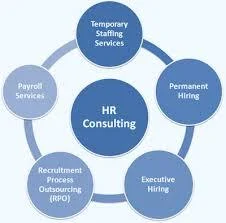Is your business struggling with complex employee issues or tangled HR regulations? You’re not alone. Many companies find managing their workforce challenging. That’s where an HR consultant comes in. They offer expert guidance to help you navigate the world of human resources. In this article, we’ll uncover what an HR consultant does and how they can benefit your organization.
What Is HR Consulting?
HR consulting means helping businesses with their human resources needs. As an HR consultant, you assist organizations with various HR tasks. For example, you might create employee benefit plans, manage hiring processes, advise on company restructuring, or resolve employee conflicts.
Imagine a small business that doesn’t know how to set up a benefits package. In this case, an HR consultant can guide them through the options and design a plan that fits their needs. Additionally, you have the flexibility to work on your own or as part of a company. You can offer general HR services or, instead, focus on specialties like labor relations.
Core Responsibilities of HR
Recruitment and Staffing
Firstly, HR consultants help companies find and hire the best talent. They create recruitment strategies, conduct interviews, and decide if candidates fit open positions. For example, an HR consultant might write a specific job ad to attract qualified applicants. Then, they review resumes to select the best candidates.
Training and Development
Secondly, they design and deliver training programs to improve employees’ skills and knowledge. This approach not only aids in career development but also supports the company’s growth. For instance, an HR consultant might organize a leadership workshop to prepare employees for management roles.
Employee Relations Management
Firstly, HR consultants manage employee concerns and resolve conflicts. They also work to build positive relationships and improve communication within the company. For instance, if there’s tension between team members, an HR consultant can mediate to find a fair solution.
Compensation and Benefits
Secondly, they develop reward systems and benefits programs to ensure fair compensation. As a result, this helps attract and keep talented employees. For example, they might introduce flexible working hours as a new benefit.
Legal Compliance and Risk Management
Lastly, HR consultants ensure the company follows employment laws. Moreover, they create policies to reduce legal risks and handle legal issues related to employees. For instance, they might revise contracts to comply with new regulations.
Skills and Qualifications for HR Consultants
| Aspect | Description |
| Educational Requirements | Bachelor’s degree in Human Resources, Business Administration, or related field preferred.Some employers may require a master’s degree or professional HR certifications for a strong knowledge base. |
| Essential Skills for Success | Effective communication and interpersonal skills.Strong problem-solving and analytical abilities.Deep understanding of HR principles and best practices.Stay updated with the latest HR trends and developments. |
| Certification and Continuous Learning | Professional certifications enhance credibility (e.g., CIPD, SHRM).Continuous learning through workshops, conferences, and online courses to expand knowledge and skills. |
Conclusion
In conclusion, HR consultants play a vital role in optimizing human resources within a company. Not only do they help with hiring top talent, but they also develop employee skills, manage relations, and ensure legal compliance. Consequently, with their support, you can traverse HR challenges smoothly.
Therefore, take the next step with HRWays. Indeed, their skilled HR consultants are ready to assist you in achieving your HR goals. Moreover, don’t miss their latest blog to discover more about the impact of HR consultants on business success.
